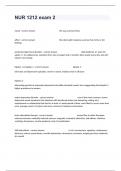NUR 1212 exam 2
mood - correct answer the way a person feels
affect - correct answer the observable response a person has to his or her feelings
persistant depressive disorder - correct answer AKA dysthmia, 2+ years for adults, 1+ for adolescents, symptom free, last no longer than 2 months, blue mostly every day, low self-
esteem, low energy
bipolar 1 vs bipolar 2 - correct answer bipolar 1- full manic and depressive episodes, severe in onset, median onset is 18 years
bipolar 2-
alternating periods of extremely depressed and mildly elevated moods, less exaggerating than bipolar 1, higher prevalence in women
major depressive disorder - correct answer one of the most common, severe depressive mood symptoms that interfere with functional status (not showering, eating, etc), employment or relationship that last for at least a 2 week period of time, most likely to occur more than once, average onset is 33 years and more common in hispanics and women
brain stimulation therapy - correct answer second line to other therapies, electroconclusive: medically induced seizures, magnetic: instead of electricity. side effects- diarrhea, vomiting, drowsiness, muscle weakness, lack of coordination
SSRI side effects - correct answer n/v/d, nervousness, agitation, restlessness, dizziness, reduce sexual desire, erectile dysfunction, drowsiness, insomnia, weight gain/loss, headache, dry mouth MAOIs - correct answer monoamine oxidase inhibitors also for refractory, but lesser used because of hypertensive crisis possibility when interacting with tyramine containing foods
SNRI - correct answer serotonin norepinephrine reuptake inhibitor best for refractory depression
SSRI - correct answer selective serotonin reuptake inhibitor- first line of choice
must wait 3 weeks to see results, and often dose is increased after 3 weeks
mood stabilizers - correct answer lithium, antiepileptic drugs, second generation antipsychotics
antidepressants - correct answer serotonin reuptake inhibitors, norepi-
dopamine reuptake inhibitors, tricyclic antidepressants, serotonin-norepi reuptake inhibitors, monoamine oxidase inhibitors
pyschotherapy types - correct answer cognitive and behavioral therapy, interpersonal therapy, family focused therapy, play therapy, sand tray therapy, light therapy, animal therapy, art therapy
mental status exam - correct answer in addition to vitals
general appearance, motor activity, mood, affect, speech, alertness & orientation
vegetative functioning - correct answer refers to appetite, sleep and energy level normally reduced energy levels, but still functioning with some ADLs, sexual desire/libido is a way of measuring this anhedonia - correct answer a diminished ability to experience pleasure
assessment presentation - correct answer agitation, sadness, elation, blunting,
monotone speech, irritability, lack of interest in normal activities
risk factors for individuals - correct answer stress, early trauma, neglect, abuse, family history, comorbid physical and psychiatric disorders, substance abuse/dependency, personality disorders
risk factors for populations - correct answer women (2-3 times higher than men), adolescents/early adult, highest frequency during late twenties/early thirties and again in late 60s
consequences of mood disturbances - correct answer high use of medical care, reduced cerebral cortex blood flow, abnormal metabolism of phosphorus, disruption of neurotransmitters (dopamine, norepinephrine, serotonin), potential for suicide and suicidal ideation, high energy or lethargy
hypomania - correct answer unstable affective state agitated and possibly euphoric, but to a less severe degree than mania with less impairment
prefrontal cortex and anterior cingulate cortex - correct answer responsible for judgment, decision making, problem solving, feelings, and emotional responses
3 influencing factors of mental health - correct answer individual (personal), interpersonal (relationships), social/culture (environment)
5 general criteria for diagnosis of mental illness - correct answer 1 dissatisfaction with characteristics, abilities or accomplishments 2 ineffective or unsatisfying relationships 3 dissatisfaction with ones place in the world 4 ineffective coping skills




